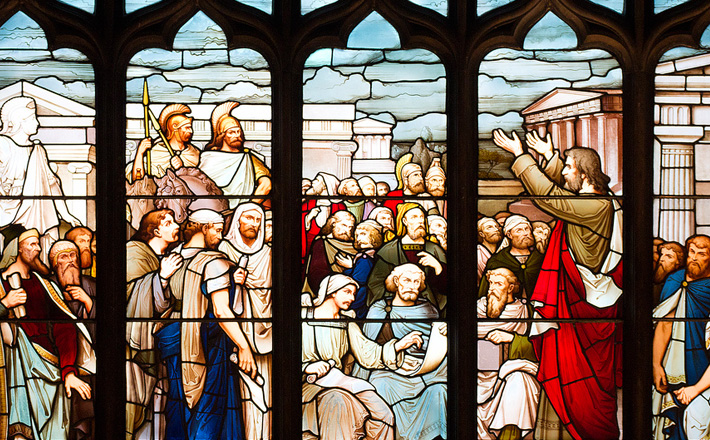Commentary on 1 Peter 3:13-22
Suffering is a central issue in the letter of 1 Peter, and it is a central focus of this week’s lectionary text.
Peter has been bringing both words of hope and caution to his readers in the first chapters of the letter. They should act in ways that are honorable and holy (1:15-17; 3:10-12) so that their neighbors and even family members (3:1) have no reason to criticize them (2:11-12). The tension inherent in their situation comes to the fore in our passage, where Peter asks the question that seems to be plaguing his audience: “Who will harm you if you are zealous for good?” (3:13; Common English Bible).
You see, these followers of Jesus in Asia Minor are on the receiving end of slander and malicious talk (2:11-12, 15). The reason for this treatment is their allegiance to Jesus as the only Lord (3:15) in a context where withdrawing from temple worship of their former gods is tantamount to sedition (4:3-4). Into this difficult situation, Peter advises the followers to adhere as much as possible to the expectations of state and household: “Submit to [emperor and governors] because it’s God’s will that by doing good you will silence the ignorant talk of foolish people” (2:15; see also 2:18; 3:1).
So, when Peter asks the question of 3:13, his audience could easily respond that they have been harmed precisely for doing good — for following their Lord in full allegiance. Peter asks the question, it seems, to call for even deeper reflection on their situation. He will readily concede in the very next breath that it is possible for his audience to suffer slander even as they live worthy lives (3:14; also 4:19). But he seems to want his readers and hearers to do a double check when this kind of external pressure comes their way.
The need for self-reflection comes into even greater focus in verse 17 where the author wonders aloud about the incongruity of suffering for doing good — “(if this could possibly be God’s will).” Peter is bent on ensuring that the slander directed toward these Christians comes from their allegiance to Jesus and nothing else.
Pursuing allegiance is a central exhortation of this passage: “set Christ apart as Lord in your hearts” (3:15; New English Translation). In a world of many lords and gods (compare to 1 Corinthians 8:5), the Petrine believers are to have only one Lord and are to be ready to speak to the hope they share in common with the community of faith (3:15b). And by speaking of their hope respectfully, humbly, and honorably, they will remain above reproach even if they are slandered by neighbors and family members. The hope held out is that their honorable behavior will in the end put to shame those who slander them.
In the rest of 1 Peter 3, Peter offers the example of Jesus to encourage his readers, as he did in 2:18-25. Here he offers the narrative trajectory of Jesus’ life to give them hope. As Jesus was vindicated after he had suffered unjustly (3:18-22), so these beleaguered followers of Jesus can look forward to vindication if they commit themselves to their faithful Creator and continue to do good (4:19; New International Version).
There are numerous interpretive difficulties in 3:18-22; most notably the identity of the disobedient and imprisoned spirits, the nature of Christ’s preaching or proclamation to them, and the source or rationale for the analogy between Noah’s situation and the Petrine context. An answer to these three significant textual questions comes from the Jewish apocalyptic book, 1 Enoch, which dates from about the second century B.C.E. In Enoch 6-16, we hear an expanded interpretation of Genesis 6-9 in its narration of the exponential growth of human sinfulness and the subsequent flood, which only Noah’s family survived. In 1 Enoch, the Nephilim (Genesis 6:4), now called the Watchers, give birth to evil spirits (1 Enoch 15:8) who bring great wickedness upon the earth that is the impetus for the great flood.
The author of 1 Peter seems to draw on this expanded telling of sin and flood from Enoch to assert Christ’s proclamation of victory over all evil (3:19), including these spirits “in prison,” a picture of God’s patient restraining versus destruction of them (3:20).1 Christ’s victory over death brings his full lordship over “all angels, authorities, and powers” (3:22), including these spirits who epitomize evil.
Because of his resurrection — his vindication, those who trust Jesus can be assured that they, like Noah’s family, will be rescued through water, an analogy for Christian baptism (3:20-21). If, as it is quite possible, the readers of 1 Peter knew these Enochian traditions,2 then in 3:18-22 they hear the story of Jesus’ vindication after suffering and his removal of all contending powers. Jesus’ storyline is meant to give hope that their own suffering will turn into vindication.
An important issue when contextualizing any part of 1 Peter is to exercise caution in making assumptions about one-to-one correspondence between then and now. Especially since first-century Christianity in Asia Minor was a minority and marginalized group, we’ll want to be careful in making direct comparisons between Christians then and Christians for example, in the U.S. today, where Christians often have significant advantages in relation to people of other faiths.3
Yet some of the motifs we hear in this text of 1 Peter may very well resonate within our own contexts. As Peter presses his readers to greater self-reflection to ensure that any suffering they are experiencing comes from and only from their allegiance to Christ, so we might caution our congregations to not too quickly assume that any persecution they encounter arises because of their faith. It always remains a possibility that they are being maligned for bad behavior and not for good. As we find ourselves in an increasingly pluralistic society, we will want to think carefully about such dynamics and lead our congregations to do so as well.
And when suffering seems to be winning the day, we can offer people the story of Jesus to give them hope (3:18-22). Although Jesus suffered unjustly, God vindicated and exalted him. This God cares about righting wrongs that have been done. And such a God is worthy of our faith and hope (1:21).
Notes:
1) Jobes, Karen H. 1 Peter. (Grand Rapids, MI: Baker Academic, 2005), 244
2) Jobes, Karen H. 1 Peter. (Grand Rapids, MI: Baker Academic, 2005), 246
3) Larson, Marion H. and Sara L. H. Shady. From Bubble to Bridge: Educating Christians for a
Multifaith World. (Downers Grove: Intervarsity, 2017), 57-61


May 21, 2017